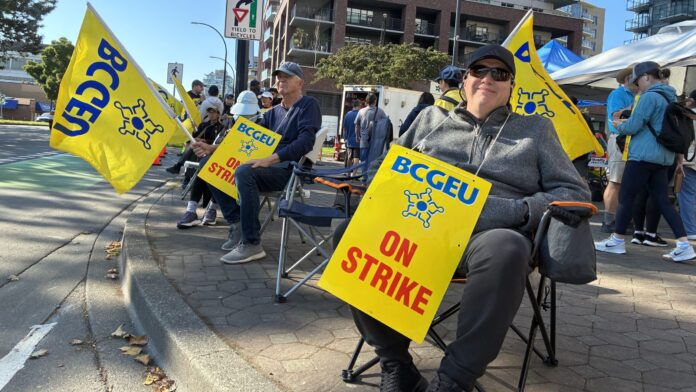The B.C. General Employees Union is again ramping up job action, amid what it says is now the longest public service strike in the province’s history.
BCGEU members have been on strike at select sites across British Columbia since Sept. 2.
The union said Tuesday more workers walked off the job today at sites in Victoria, Penticton, Cranbrook, Coquitlam and Kamloops.
BCGEU said more than 12,500 public service workers are now engaged in job action, including at 33 active picket lines.
It said escalations will continue throughout the week.
Last week, members at the Ministry of Citizen’s services joined picket lines, marking a shift for the strike toward front-line services. The union said the move could lead to delays or disruptions to services such as issuing B.C. Services Cards and processing freedom-of-information requests.
BCGEU announced workers at liquor and cannabis warehouses walked off the job on Monday. Industry groups warned of potential shortages and lost revenue for some retailers.
The union said the government’s refusal to return to the table with an acceptable deal has left workers no choice but to escalate job action “sharply.”
The BCGEU represents about 34,000 public service workers, including wildland firefighters, conservation officers, social workers, correctional officers, administrative professionals and others.
Their previous collective agreement with the Public Service Agency expired at the end of March.
BCGEU President Paul Finch has said public service workers are going through an “affordability crisis.”
The union is calling for an 8.25 per cent wage increase over the two-year deal, while the province’s most recent counter offer includes a 3.5 per cent increase over two years.
The Professional Employees Association (PEA) launched a strike at the same time as BCGEU. The union represents government licensed professionals, like engineers, psychologists and other specialized experts.
PEA announced Tuesday engineers from the Ministry of Transportation in the B.C. Public Service had joined the strike. The union said the engineers are responsible for both the day-to-day operation of BC’s highway network and the delivery of major infrastructure projects.
“British Columbians expect safe roads, reliable bridges, and responsible spending of public dollars,” said Melissa Moroz, Executive Director of the PEA, in a statement. “That can only happen with qualified professionals on the job. It’s time for the government to make fair compensation a priority so these experts can get back to work.”
Both unions have are required to maintain essential service, as determined by the Labour Relations Board.
Something going on in the Prince George area you think people should know about?
Send us a news tip by emailing [email protected].







